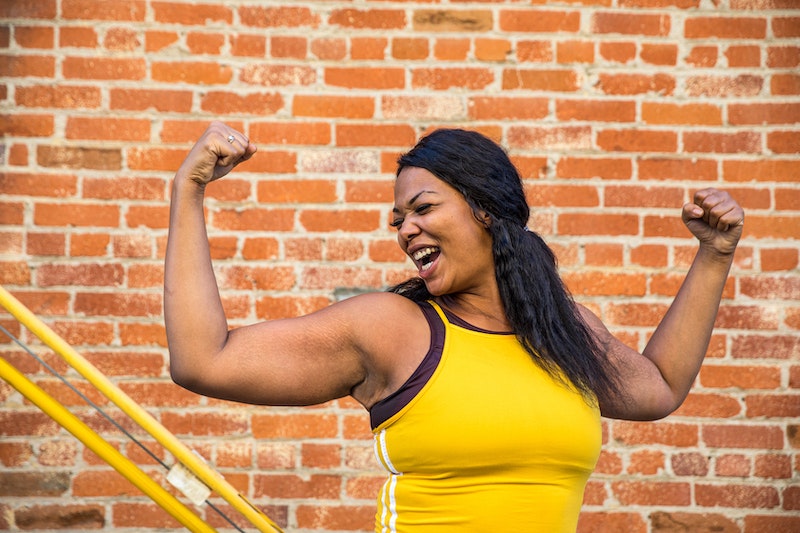Move over, freshman 15. For many, the past year has created a “quarantine 15,” weight gain driven by new routines (good-bye gym visits, hello home office) and increased stress. Now, as our routines move back toward normalcy, losing weight is a top goal for many people.
Maintaining a healthy weight can mean serious health benefits (including lower risk of Type 2 diabetes and some types of cancer). But it’s important to realize that you don’t have to reach a certain number on the scale to love your body and what it can do.
Appreciating and even celebrating your body may make it easier to follow through on all of the healthy habits you’re trying to reclaim.
“Body positivity is about accepting in a nonjudgmental way there will inevitably be times you don't feel good about the way you look. That is natural and that is OK,” says Rachel Rodgers, PhD, a professor of psychology at Northeastern University. “It's about how you relate to the body you are in — do you appreciate all it can do, do you take care of it in a compassionate way?”
“We take good care of things we value,” says Rebecca Scritchfield, RDN, author of Body Kindness. Indeed, an analysis in the journal Health Psychology found that people who were higher in the trait of self-kindness were more likely to exercise regularly, eat healthy, manage stress, and get enough sleep. “Replacing your inner critic with your inner caregiver,” is more motivating in the long term, she says.
On the other hand, constant self-criticism can take a heavy mental and physical toll. “Negative body image can cause depression and anxiety and set the stage for disordered eating,” says Pamela Keel, PhD, a professor of psychology at Florida State University. “Feeling bad about yourself is not a good motivator to make healthier changes.”
Not sure how to start loving the skin you’re in? Experts share five steps to get started:
Celebrate what your body can do
Next time you find yourself harping on a shortcoming, try to shift your inner dialogue toward what your body is capable of doing, suggests Anne Poirier, an eating disorder specialist and founder of Shaping Perspectives coaching. Take stock of your body’s amazing functions: These arms can hold my child. These legs can walk my dog. My eyes can watch this glorious sunset.
A 2019 study from Maestricht University in the Netherlands found appreciating what researchers call “body functionality” in this way resulted in a boost in happiness in men and women. Poirier suggests her clients record these kinds of positive affirmations in their own voice to listen to if they need encouragement.
Pretend you’re a friend
“We often say things about our own bodies that we would never say about the bodies of someone we loved,” says Renee Engeln, PhD, director of the Body and Media Lab at Northwestern University and the author of Beauty Sick: How the Cultural Obsession with Appearance Hurts Girls and Women. Self-compassion means treating yourself with the same care and concern you would offer a loved one.
If you find yourself beating yourself up in the swimwear dressing room, ask yourself, what would I say to a friend who was talking like this? Then speak that same kindly way to yourself. Or consider penning a “self-love” letter: Engeln’s research has found that doing so improves both mood and body image.
The self-love letter prompt is based on extensive research by Kristin Neff, PhD, a pioneer in the academic study of self-compassion. “Take 10 minutes and write a letter to yourself, about your body, from the perspective of an imaginary friend who loves you unconditionally,” advises Engeln. “How would this friend convey the deep compassion they feel for you, especially for the pain you feel if you tend to judge the flaws and imperfections of your body harshly? What would this friend write in order to remind you that you are only human, that all bodies have both strengths and weaknesses?”
Really look at yourself
Ever dash from the shower, eyes averted from the — eeeek — reflection? Instead, an intervention called “mirror exposure” can be used as a tool for greater body acceptance, says Keel, who has tested it on both men and women.
Stand in front of the mirror, wearing as little clothing as you are comfortable with, she says. “Really look at your body, and say out loud what it is you appreciate.” If you find the prospect a bit scary, start small — my hands helped me make this great cup of coffee. Adopt it as a regular practice and over time move on to praising more “high risk” areas, says Keel. I really like my hips. I have beautiful ears.
Go for it
Don’t wait for some idealized tomorrow to do an activity you have been avoiding out of embarrassment at not having a perfect body. “Expose yourself to those fears and you will overcome them. You realize nothing bad will happen if you wear a bathing suit in public for instance,” says Keel. “You will experience a sense of freedom. You will enjoy the feeling of plunging into the cool on a hot day, moving through the water. Taking such actions reinforces body acceptance through experience.”
Poirier also encourages clients to make themselves comfortable right now. “Walking around all day in clothes that are too tight just reminds you all day how uncomfortable it is to be in your body. You deserve to buy and wear clothes that make you feel good.”
Rethink social media
Scrolling through all those perfect smoothies and perfect eyebrows in your feed can make you feel less than. Not surprisingly, a number of studies have linked social media use with lowered self-esteem. You don’t have to toss your iPhone, says Rodgers. Instead consciously curate your feed. “As you scroll, check in with yourself. Ask yourself, how is viewing this content making me feel?”
Filter out those accounts that make you feel inadequate. And make it a point to follow feeds that you find nourishing or that celebrate a healthier perspective. A 2019 study in the journalNew Media and Society showed that even brief exposure to body positive posts was associated with improvements in young women’s positive mood, body satisfaction, and body appreciation.
JENNIFER KING LINDLEY
Rally Health





